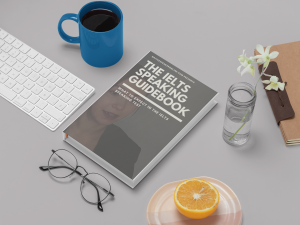I don’t know how many times IELTS candidates have asked me this question. Unfortunately, there is no simple answer. Simply “practising your speaking” is not enough. Nor is doing vocabulary and grammar exercises. The natural process of learning how to speak fluently and accurately is a little more complicated than that.
Firstly, you need to understand how we learn to speak. When you were a child you learnt by observing and repeating. You formed the habit of thinking in your native language. Learning to speak a foreign language as an adult is a completely different challenge, but the biological process of learning is not much different. With this in mind, let’s look at some practical tips to help you speak better English.
Think in English
People who think in English are usually able to speak confidently and without hesitation. If you always think in your native language, you will need to translate your thoughts first in your mind before speaking. This will slow down your speech or cause you to hesitate a lot. So try to think in English as much as possible.
Observe, observe, observe!
When you listen to native speakers, don’t be lazy! Listen very carefully to how they express themselves, the words and phrases they use when they are thinking aloud, the collocations they use, etc. If you can, take notes. Listening is extremely important for improving your speaking and pronunciation.
Become aware of your mistakes
Most learners repeat the same mistakes without realising it. You can become aware of your mistakes by listening to native speakers. If they say the same thing as you but in a slightly different way, then it is possible that you are saying it wrong. If you have read my Typical mistakes in English eBook, you must try to notice when native speakers use the corrected mistakes that I present in the book. The combination of learning and observing is extremely effective!
Speak English
Ok, this one is obvious. But I’ve included it in the list to show you that speaking in English is only one of many activities that will improve your spoken English. If you don’t have a teacher or friend to practise with, try to find a language partner online. These sites may help you:
www.italki.com
www.mylanguageexchange.com
www.ieltsspeakingtips.com
Use a dictionary
If you live in an English speaking country, keep a dictionary with you all the time or use a good dictionary app on your smartphone which allows you to hear the words. When you learn a new word in English, you need to know how to pronounce it.
Talk to yourself in English
Talking to yourself regularly in English will make you more comfortable speaking and it will also help you to think in English (see above). In addition, you don’t need to worry about making mistakes because nobody is listening to you.
Learn synonyms
If you can learn how to say the same things in different ways, your speaking will improve dramatically. This will take some time, so start by learning some simple synonyms of common adjectives, for example difficult, hard, tough, tricky. Find examples in Google of how these words are used and use them in your speaking. There are more simple synonyms in this post.
Change your speed
Record yourself speaking. Do you speak too slowly or too quickly? If you speak too quickly and make lots of mistakes, try to slow down and think about your words more carefully. If you speak too slowly, try to think in English instead of your native language and try to worry less about making mistakes — 25% of the IELTS speaking score is based on fluency so avoiding mistakes is not enough for a high band.
Read aloud
Read a text aloud. This will improve your vocabulary, grammar and also your speaking. But make sure you understand what you are reading, so make use of your dictionary.
Watch English television and films
Whenever you have the opportunity, watch English television programmes or films that you enjoy. Try to watch something with English subtitles. This will really improve all areas of your spoken English. If you are not at an advanced level, avoid the BBC news channel, which is very advanced.
Don’t worry about your accent
Having an accent is normal. In fact, it can even make you sound interesting. As long as people can understand you clearly, your accent is the last thing you should worry about!

This FREE eBook Shows You What Kinds of Tasks and Questions to Expect in the IELTS Speaking Test.

its a great help for us. The tips are really important for me asw i can improve on my speech. Is there any site which can improve in writing and reading?